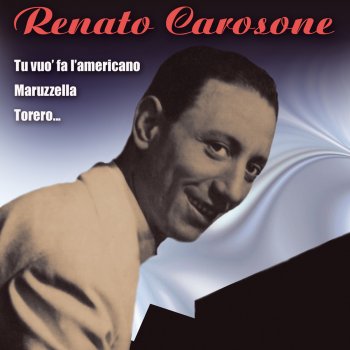
It had a wide exposure and appeared on two of their albums, The Men from Uncle (1998), and Live in Italy (2000).
The song was covered by the Gisella Cozzo and Ray Gelato Giants in 1998, with their version of the track used for a worldwide television commercial for Levi's. The Brian Setzer Orchestra covered this song with their song, "Americano." This song appeared on their album Vavoom!. Lou Bega made a cover of the song entitled " You Wanna Be Americano". The song was created in 1957 by Freddy Balta on its humoristic EP Fredo Minablo et sa pizza musicale ( Fredo Minablo and its musical pizza). Boris Vian adapted it in French under the name "Tout fonctionne à l'italiano" ("Everything goes italiano") to parodize the then French craving for Italian things. According to the Italian newspaper la Repubblica, "Tu vuò fa l'americano" is the definitive hit single of Carosone's artistic career, as he retired from music in 1960, just four years after releasing the song. The song is generally considered to be a satire of the Americanization that occurred in the early years after World War II, when southern Italy was still a rural, traditional society. The lyrics are about an Italian who affects a contemporary American lifestyle, drinking whisky and soda, dancing to rock 'n roll, playing baseball and smoking Camel cigarettes, but who still depends on his parents for money. It was also performed by Rosario Fiorello in the 1999 film The Talented Mr. The song was featured in the 1960 Melville Shavelson film It Started in Naples, in which it was sung by Sophia Loren. Commissioned by Ricordi director Rapetti for a radio contest, the music was composed by Carosone in a very short time after reading Nisa's lyrics he immediately believed the song would become a great success.Ĭarosone's original version of the song was performed by him in the film Totò, Peppino e le fanatiche (directed by Mario Mattoli, 1958). 
Combining swing and jazz, it became one of his best-known songs. " Tu vuò fà l'americano" ( pronounced "You Want to Be American") is a Neapolitan language song by Italian singer Renato Carosone.Ĭarosone wrote the song in collaboration with Nicola "Nisa" Salerno in 1956. Carosone was immediately sure that the song would have a great success, and in fact, once released by the Pathé record company on 45 rpm in 1956 and on EP the following year, it achieved international success and is still the best-known song of the singer-songwriter.1956 song by Renato Carosone "Tu vuò fà l'americano" The composer combined swing and jazz music on the piano, achieving a boogie woogie in just a quarter of an hour after reading Salerno's text.

The song was written in 1956 by Carosone for the musical part, and by Nisa (Nicola Salerno) for the text. Carosone fu immediatamente sicuro che il brano avrebbe ottenuto un grande successo, e infatti, una volta pubblicata dalla casa discografica Pathé su 45 giri (GQ 2032) nel 1956 e su EP l'anno successivo (GQ 534), raggiunse il successo internazionale ed è tuttora la canzone più nota del cantautore.

Il compositore combinò musica swing e jazz al pianoforte, realizzando un boogie woogie in un solo quarto d'ora dopo aver letto il testo di Salerno. La canzone fu scritta nel 1956 da Carosone per la parte musicale e da Nisa per il testo.







 0 kommentar(er)
0 kommentar(er)
